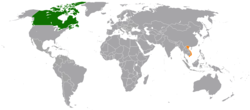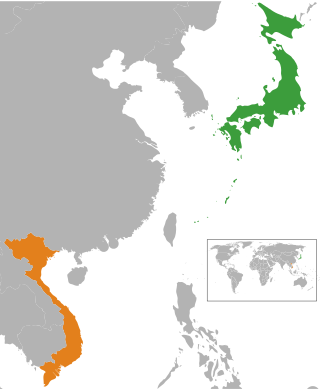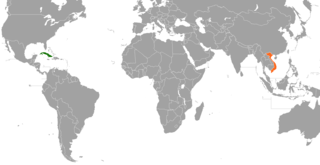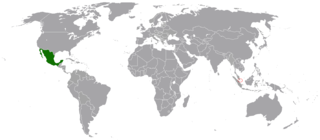 | |
Canada | Vietnam |
|---|---|
Canada and Vietnam have maintained bilateral relations since 1973. Both nations are members of the Asia-Pacific Economic Cooperation, Organisation internationale de la Francophonie and the United Nations.
 | |
Canada | Vietnam |
|---|---|
Canada and Vietnam have maintained bilateral relations since 1973. Both nations are members of the Asia-Pacific Economic Cooperation, Organisation internationale de la Francophonie and the United Nations.
Canada and Vietnam share a common history in the fact that both nations were part of the French colonial empire. During the Vietnam War, Canada remained officially neutral, though there had been mutual assistance periodically. However, with regards to Vietnam, itself, Canada was a member of the International Control Commission overseeing the implementation of the Geneva Agreements, and provided peace keepers in Vietnam. Casualties were suffered along the way. After the Fall of Saigon, from 1979 to 1980 Canada admitted 60,000 refugees from Vietnam. [1]
In 1973, Canada and Vietnam established diplomatic relations. [2] In September 1976, Vietnam opened an embassy in Ottawa, however, the embassy was closed in 1981. Vietnam reopened its embassy in Ottawa in 1990. [3] In 1994, Canada opened a resident embassy in Hanoi. [2]
In November 1994, Canadian Prime Minister, Jean Chrétien, paid an official visit to Vietnam, the first Canadian head-of-government to do so. [3] In June 2005, Prime Minister, Phan Văn Khải, became the first Vietnamese head-of-state to visit Canada. Since the initial visits, there have been several high-level visits between leaders and foreign ministers of both nations. [3] Recent visits include Canadian Prime Minister, Justin Trudeau, paying a visit to Vietnam to attend the 29th APEC Summit in Hanoi in November 2017. In June 2018, Prime Minister Nguyễn Xuân Phúc paid a visit to Canada to attend the 44th G7 summit in La Malbaie. [3]
In 2018, both nations celebrated 45 years of diplomatic relations. [4]
|
|
Both nations have signed several agreements such as an Agreement on Economic and Technological Cooperation between Vietnam and Quebec (1992); Agreement on Development Cooperation (1994); Agreement on Trade and Commerce (1995); Agreement on the Avoidance of Double Taxation and the Prevention of Fiscal Evasion with Respect to Taxes on Income (1997); Memorandum of Understanding on Service and Infrastructure Development (2000); Memorandum of Understanding on Project of Assistance Policy (2001); Agreement on Aviation Transportation (2004); and an Agreement on Adoption (2005). [3]
In 2018, Canada and Vietnam signed the Comprehensive and Progressive Agreement for Trans-Pacific Partnership, along with other nations along the Pacific Rim. In 2018, two-way trade between both nations totaled US$6.4 billion. [2] Vietnam has been Canada's largest trading partner in the ASEAN region since 2015. The priority areas in Vietnam for Canadian commercial interests are agriculture and agri-food, education, information and communication technologies, clean technology, infrastructure, and aerospace. [2]
| Embassy of Canada in Hanoi | |
|---|---|
 Residence of the Embassy of Vietnam in Ottawa | |
| Location | Hanoi |
| Address | 31 Hùng Vương, Điện Biên, Ba Đình, Hà Nội, |
| Ambassador | Shawn Steil |
| Embassy of Vietnam in Ottawa | |
|---|---|
| Location | Ottawa |
| Address | 55 Mackay St. K1M2B2 |
| Ambassador | Pham Vinh Quang |

As of September 2024, Vietnam maintains diplomatic relationships with 191 UN member states, State of Palestine and Sahrawi Arab Democratic Republic. In 2011 the Central Committee of the Communist Party of Vietnam, at the 11th National Congress of the Communist Party of Vietnam, released an official statement about Vietnam's foreign policy and a section of the statement stated: "Vietnam is a friend and reliable partner of all countries in the international community, actively taking part in international and regional cooperation processes. Deepen, stabilize and sustain established international relations. Develop relations with countries and territories in the world, as well as international organizations, while showing: respect for each other's independence; sovereignty and territorial integrity; non-interference in each other's international affairs; non-use or threat of force; settlement of disagreements and disputes by means of peaceful negotiations; mutual respect, equality and mutual benefit."

Japanese–Vietnamese relations are over a millennium old, and the establishment of friendly trade relations can be traced to at least the 16th century. Modern relations between the two countries are based on Vietnam's developing economy and Japan's role as an investor and foreign aid donor, as well as migrant Vietnamese workers supplying much needed labour in Japan.

Formal relations between the United States and Vietnam were initiated in the nineteenth century under former American president Andrew Jackson, but relations soured after the United States refused to protect the Kingdom of Vietnam from a French invasion.

Relations between Vietnam and China had been extensive for a couple of millennia, with Northern Vietnam especially under heavy Sinosphere influence during historical times. Despite their Sinospheric and socialist background, centuries of conquest by modern China's imperial predecessor as well as modern-day tensions have made relations wary. The People's Republic of China (PRC) ruled by the Chinese Communist Party (CCP) assisted North Vietnam and the Communist Party of Vietnam (CPV) during the Vietnam War whilst the Taiwan-based Republic of China (ROC) was allied with South Vietnam.

India–Vietnam relations, also known as Indian-Vietnamese relations, are the bilateral relations of India and Vietnam.

Phan Thanh Giản was a Grand Counsellor at the Nguyễn court in Vietnam. He led an embassy to France in 1863, and committed suicide when France completed the invasion of Southern Vietnam (Cochinchina) in 1867.

Denmark–Vietnam relations relates to foreign relations between Denmark and Vietnam. Both countries established diplomatic relations on November 25, 1971. On April 1, 1994, Denmark established an embassy in Hanoi, and since August 12, 2000, Vietnam has had an embassy in Copenhagen.

Israel–Vietnam relations refers to the bilateral relations between the State of Israel and the Socialist Republic of Vietnam. Vietnam and Israel established diplomatic relations on July 12, 1993, followed by Israel opening its resident embassy in Hanoi in December 1993. The current Vietnamese Ambassador to Israel is Lý Đức Trung, who has been assigned since April 2022. Ambassador Lý Đức Trung operates out of the Vietnamese embassy in Tel Aviv. The current Israeli Ambassador to Vietnam is Yaron Mayer, who has been assigned since August 2022. Ambassador Mayer operates out of the Israeli embassy in Hanoi.

Malaysia–Vietnam relations date to at least the 15th century. Malaysia forged diplomatic ties with the modern-day Vietnamese state on 30 March 1973; as of 2015, these ties are still in existence. During the late 1970s and 1980s, the countries' relationship became strained as a result of the Cambodian–Vietnamese War and the influx of Vietnamese boat people into Malaysia. The subsequent resolution of these issues saw the cultivation of strong trade and economic ties, and bilateral trade between the countries grew strongly, with an expansion into areas including information technology, education and defence. Both countries are members of APEC and ASEAN.

Holy See–Vietnam relations are foreign relations between the Holy See and Vietnam.
Đỗ Thanh Nhơn was an 18th-century Vietnamese military commander.

After World War II and the collapse of Vietnam's monarchy, France attempted to re-establish its colonial rule but was ultimately defeated in the First Indo-China War. The Geneva Accords in 1954 partitioned the country temporarily in two with a promise of democratic elections in 1956 to reunite the country. The United States and South Vietnam insisted on United Nations supervision of any election to prevent fraud, which the Soviet Union and North Vietnam refused. North and South Vietnam therefore remained divided until the Vietnam War ended with the Fall of Saigon in 1975.

Cuban–Vietnam relations are the interstate and special relations between the Republic of Cuba and the Socialist Republic of Vietnam. The relations are based on trade, credits, and investments which have increased significantly since the 1990s and on shared ideological beliefs – they are both socialist states. Diplomatic relations between the post-revolutionary Cuba and the Democratic Republic of Vietnam were established on December 12, 1960. Since then, Vietnam has become Cuba's second-largest trading partner in Asia, with Vietnam trailing behind China.

Indonesia and Vietnam established diplomatic relations in 1955. Indonesia has an embassy in Hanoi and a consulate general in Ho Chi Minh City while Vietnam has an embassy in Jakarta. Both are neighboring nations that have a maritime border which lies on the South China Sea and are members of ASEAN and APEC.

Ukraine–Vietnam relations are the bilateral relations between Ukraine and Vietnam. Vietnam recognized Ukraine's independence from the Soviet Union on 27 December 1991. Diplomatic relations between the two countries were established on 23 January 1992. The embassy of Vietnam in Ukraine started its operations in 1993, and the embassy of Ukraine in Vietnam was opened in 1997.

The nations of Mexico and Vietnam established diplomatic relations in 1975. Both nations are members of the Asia-Pacific Economic Cooperation, Forum of East Asia-Latin America Cooperation and the United Nations.

The nations of Mexico and Singapore established diplomatic relations in 1975. Both nations are members of the Asia-Pacific Economic Cooperation, Forum of East Asia–Latin America Cooperation and the United Nations.

Singapore–Vietnam relations refer to the bilateral relations between the Republic of Singapore and the Socialist Republic of Vietnam. Singapore and Vietnam started the trade relations in the 19th century. Due to the anti-communist policy of Singapore, Singapore supported South Vietnam before the unification of Vietnam. Singapore also started formal diplomatic relations with North Vietnam on August 1, 1973. After the unification of Vietnam, Singapore started to improve its relations with the Socialist Republic of Vietnam. Relations worsened during the Cambodian–Vietnamese War, but have improved once more after the People's Army of Vietnam withdrawal from Cambodia.

Germany–Vietnam relations are the bilateral relations between Germany and Vietnam.

New Zealand–Vietnam relations refers to the relations between New Zealand and Vietnam. New Zealand has an embassy in Hanoi and a consulate-general in Ho Chi Minh City. Vietnam has an embassy in Wellington.